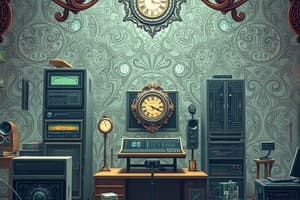Podcast
Questions and Answers
What components store both temporary and permanent information in a computer system?
What components store both temporary and permanent information in a computer system?
- Operating systems
- Power supplies
- Storage drives
- Memory chips (correct)
Which component of a computer ensures uninterrupted electricity flow?
Which component of a computer ensures uninterrupted electricity flow?
- Operating systems
- Power supplies (correct)
- Memory chips
- Storage drives
What software applications facilitate user interaction with a computer's operating system?
What software applications facilitate user interaction with a computer's operating system?
- Business management tools
- Graphical environments
- Text editors (correct)
- Operating systems
Which component controls how computers handle inputs from peripherals like keyboards and mice?
Which component controls how computers handle inputs from peripherals like keyboards and mice?
What is the purpose of graphical environments in a computer system?
What is the purpose of graphical environments in a computer system?
What do software applications vary in, from simple to sophisticated?
What do software applications vary in, from simple to sophisticated?
What are the three main parts of a computer system?
What are the three main parts of a computer system?
Which component of a computer system is often referred to as the 'brain of the machine'?
Which component of a computer system is often referred to as the 'brain of the machine'?
What is the main purpose of personal computers (PCs)?
What is the main purpose of personal computers (PCs)?
How have computer systems evolved over the years since their invention?
How have computer systems evolved over the years since their invention?
What is the primary function of large mainframe computers?
What is the primary function of large mainframe computers?
Which component of a computer system is responsible for processing all data?
Which component of a computer system is responsible for processing all data?
Flashcards are hidden until you start studying
Study Notes
A computer system is a collection of interconnected devices, software programs, and hardware components designed to perform specific tasks and functions on behalf of users. At its most basic level, a computer system consists of three main parts: input devices like keyboards or mice; output devices like monitors or printers; and central processing units (CPU) where all data is processed. These elements work together to allow people to interact with computers through the manipulation and display of information.
Computers can be categorized into different types depending upon their intended purpose and size. For example, personal computers (PCs), which typically consist of desktop machines and laptops, serve individual users for activities such as word processing or sending emails. On the other hand, large mainframe computers manage complex operations across entire organizations and are used by many individuals simultaneously. Computer systems have evolved significantly since their invention over fifty years ago, making them more powerful and accessible than ever before.
The core component of any computer system is the CPU, often referred to as the brain of the machine because it performs all the calculations needed to operate the device. Other essential components include memory chips which store both temporary and permanent information; storage drives such as hard disks or floppy discs which hold longer term files and documents; and power supplies which ensure uninterrupted electricity flow. Together these parts make up what we commonly refer to as a PC.
In addition to these physical components there are also various software applications that run within a computer's operating system to facilitate user interaction with the device. Operating systems control how computers handle inputs from peripherals like keyboards, mice, scanners etc., while providing graphical environments where users can access files or create documents. Software applications range from simple text editors to sophisticated business management tools - each one has been specifically designed to meet a particular need. Ultimately, regardless of variety or complexity, all modern computer systems depend heavily upon this combination of hardware and software working seamlessly together.
Studying That Suits You
Use AI to generate personalized quizzes and flashcards to suit your learning preferences.




